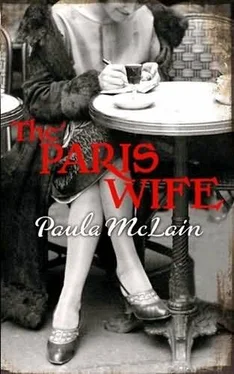Fonnie came into the room and sat near Mother. “What about your headaches?” she said.
“I’ll be perfectly fine.”
Fonnie’s brow furrowed skeptically.
“Mary can care for me if something happens. You know how competent she is.” I put particular stress on the word competent because my mother loved and was often persuaded by it. For the moment, however, she only sighed and said she would give it serious thought, which meant that she would take the matter up with our neighbor Mrs. Curran and the Ouija board.
Mother had long been interested in matters of the occult. There were séances in our house occasionally, but many more of them down the street at Mrs. Curran’s. According to my mother, she was a savant of the supernatural and had a very familiar and persuasive way with the board. I wasn’t invited to attend the session, but when Mother returned home from Mrs. Curran’s she reported that I could go to Bryn Mawr after all, and that everything would be well.
Later I had to wonder about Mrs. Curran’s prophecy because it seemed blatantly false to me. I did go away, in 1911, but the whole venture was doomed before it even began. The summer before I left for Bryn Mawr, my older sister Dorothea was badly burned in a fire. Though she was well out of the house during the years I was growing up, Dorothea had always been the kindest and most supportive member of my family, and I felt she understood me in a way no one else did or wanted to. When things at home grew too stifling and restrained, I’d walk to her house and watch her two young boys wrestling around her, feeling calmed and restored.
Dorothea was very pregnant that summer. She was home alone with the boys a great deal, and one afternoon the three were out on the front porch when Dorothea saw that a fire had started in a pile of rubber tires in the empty lot next door. The boys were curious about it, but Dorothea was afraid it might spread to her own yard. She ran over and tried to stamp out the flames with her feet, but her long summer kimono quickly caught fire. Her stockings did, too, badly burning her all the way to the waist before she fell to the ground and rolled, snuffing out the flames.
When her husband, Dudley, called us with the news, we were at our vacation cottage on Ipswich Bay. We were all worried sick about Dorothea, but Dudley reassured us she was in the hospital getting the best of care. She had no fever, and the doctors believed she would recover fully. The next day, she delivered a stillborn baby girl. Dorothea and Dudley were both devastated, but the doctors were still saying she’d live. They kept saying that until she died, eight days after the fire. Mother got on a train for the funeral, but the rest of us stayed in Ipswich, heartbroken and numb.
I remember feeling that I might not survive Dorothea’s loss, and maybe that I didn’t want to. Mother came back from St. Louis, bringing Dudley and the boys with her. They stepped off the train looking wretched, and what comfort could I offer? They have no mother , I found myself thinking over and over.
One afternoon shortly after the funeral there was a terrible storm in Ipswich Bay, and I talked one of the boys from a neighboring cottage into taking me out in it, in a rowboat. Waves slashed at the bow and came stinging over the sides and into our faces. I couldn’t even swim, but he didn’t turn back, even when the lighthouse captain signaled us to come in. The clouds were low and terrible and the air was drenched and salty. I felt as I if was drowning the whole time, over and over again. And even when we made it back to shore that day, the feeling that I was still out in the bay, sinking deeper and deeper, stayed with me through the rest of that summer and long afterward.
In September I boarded the train and went off to Bryn Mawr as planned, but my classmates seemed to be running on a different frequency. The girls in my dorm spent their afternoons in the salon drinking tea and frothy hot chocolate, talking about dance mixers and potential conquests. I felt well removed. As a girl I knew I was pretty, with bright red hair, nice eyes, and fair skin-but now I couldn’t seem to care whether boys noticed me or not. I stopped taking an interest in my clothes and my coursework, too. I began to fail exams, which was difficult and surprising to me, since, aside from my appalling pile of absences, I’d been a good student all of my life. Now I found I couldn’t summon any focus or attention or even interest.
The next fall, I let Fonnie and my mother persuade me to stay home. I can’t say it was any better for me there than at school. There was nowhere to go in the house to escape my dark thoughts. I couldn’t sleep, and when I could, I had terrible, obsessive dreams about Dorothea and my father, replaying the last awful moments of their lives. I’d wake to a panicked feeling and the promise of more joyless days and nights. And if I said that I remained in this kind of coma for eight more years, then you’d understand how ready I was to live just as my mother began to die.
My mother was sick with Bright’s disease for years, but things got quickly worse in the summer of 1920. Throughout the hottest weeks of July and August, I hardly ever left the upstairs apartment, and when I did leave, she worried endlessly.
“Elizabeth? Is that you?” she called out weakly as soon as she heard me on the stairs. I wasn’t sure why she was using my given name after all these years, but much about her baffled me just then. She didn’t resemble the steel-spined and difficult woman who had always been able to dissolve me with a single word. She was frail and anxious, calling out again as I hurried up the stairs: “ Elizabeth? ”
“I’m here, Mother.” I came into the main room where she rested on the worn pink velvet settee. I put down my shopping bags and unpinned my hat. “Are you too warm? Can I open a window?”
“Is it warm?” Her hands kneaded the afghan in her lap. “I’m chilled to the bone.”
I pulled a chair over to the settee and took up her hands, rubbing them to bring blood to the surface, but wherever I touched, the impressions of my fingertips became set, as if her skin had become bread dough. I let her go and she started to whimper.
“What can I do?”
“Bring your sister. I need Fonnie with me now.”
I nodded and stood to leave, but her eyes opened wider. “Don’t go, please don’t leave me.” So I sat again, and this is how it went, all that long night. She took a little broth and slept lightly for a few hours. Then, near midnight, she became suddenly calm.
“I worry greatly for you, Elizabeth,” she said. “What will become of you when I’m gone?”
“I’m a grown woman, Mother. I’ll be fine. I promise.”
“No.” She shook her head. “Years ago Mrs. Curran and I spoke to Dorothea about you.” Her breath was labored, and I didn’t want to see her struggle this way.
“Shh. It doesn’t matter.”
“It does. We asked her about you several times and she rebuffed us. She had nothing to say.”
I’d always been skeptical of the occult-the board, the hushed, candlelit séances and automatic writing sessions with red scarves on the lamps-but now I felt a rush of cold through me. Was it possible that Mother had been in touch with Dorothea? And if so, why had my sister, dead for nine years, turned her back on me? Did she know something hard and sad about my fate? The idea terrified me and yet there was no way to be certain. I couldn’t ask my mother to elaborate on the session; she was exhausted and more anxious than ever. I also wasn’t entirely sure I wanted to know. What if the future was worse than the present? What if it didn’t exist at all?
All that August night I stayed in the straight-backed chair next to the settee. I swabbed Mother’s forehead and neck with a damp cloth and looked out at the warm summer night, the dark sky and darker trees, everything as remote as exhibits in a museum. And I knew that I too could die in this room. This was one way my life’s wheel could turn.
Читать дальше












